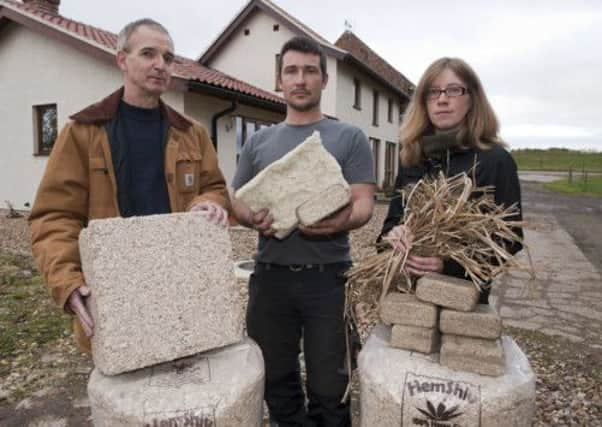Green building tangled in red tape


After losing 60 acres of potatoes to flooding in 2007, the Voase family took the brave decision to diversify. They sold their potato harvesting equipment off and invested the money in the kit they needed to grow and process hemp to create hempcrete, a sustainable building material. Nick Voase’s parents now live in a hempcrete house and he’s currently building one for his own young family.
However, they quickly discovered that they would have to deal with two tiers of government bureaucracy because of hemp’s status as a drug. This meant applying to the Home Office for a licence, as well as dealing with Defra (Department for the Environment, Food and Rural Affairs), despite the fact that it’s a completely different strain of the plant to the type grown illegally to produce cannabis.
Advertisement
Hide AdAdvertisement
Hide AdNick said: “Hemp really is the ultimate sustainable crop and can be used in a range of industries, for example hemp fibre can be used in loft insulation and the production of car parts.
“There has been little support and we took quite a risk. We tried applying for a Rural Enterprise Development Grant, but couldn’t get any financial support. Licensing issues have been a costly and complex problem; we had to fill in an application to the Home Office as if you were dealing with an illicit substance and we even had to have a CRB (Criminal Record Bureau) check.”
Nick believes that a lack of awareness and understanding of the benefits of green building materials is also an issue. He said: “When my parents applied for planning permission to build their hempcrete home, they had quite a battle with East Riding of Yorkshire Council, but when I applied to build my house more recently it was much more straightforward.
“You find there’s huge variation in how different local authorities view green building materials. Locally, they seem to understand the benefits much better now than when my parents submitted their planning application, but, elsewhere in the country, people are still having battles.”
Advertisement
Hide AdAdvertisement
Hide AdThe Voase family have shared their experiences of red tape with researchers from the University of Hull’s Department of Geography Environment and Earth Sciences, who are conducting a qualitative survey of the sustainable building sector. The research found that there’s a tendency for government policy to favour large businesses in the construction sector over small to medium-sized enterprises.
It also showed that banks are unwilling to invest in green businesses and that there’s a shortage of skilled labour capable of using sustainable building materials.
Researcher Dr Kirstie O’Neill explained: “We carried out the research to get a better idea of what was going on in the green building sector and we conducted interviews with around 50 ‘ecopreneurs’, as we call them. These businesses have a major role to play in helping the government to achieve climate change targets; the aim is for all new homes built by 2016 to be zero carbon. There are a lot of targets, but, it seems, not much action.
“We interviewed Nick because the Voase family is not only growing hemp but they’re also building with it. We found that they were having to deal with a whole extra layer of bureaucracy, despite the fact that the plant they grow bears little resemblance to the kind of hemp that people smoke.
Advertisement
Hide AdAdvertisement
Hide Ad“The majority of businesses we spoke to said that, despite the government’s good wishes and talk about green building, they’ve struggled with bureaucracy and ever-changing policies. There’s a lack of grants for businesses keen to set up in the sector and funding is not available from the banks. Where businesses could access funding, they were able to create jobs instantly.”
Although Kirstie and her colleagues are still analysing the research, the findings will be used to try to inform and influence policy makers.